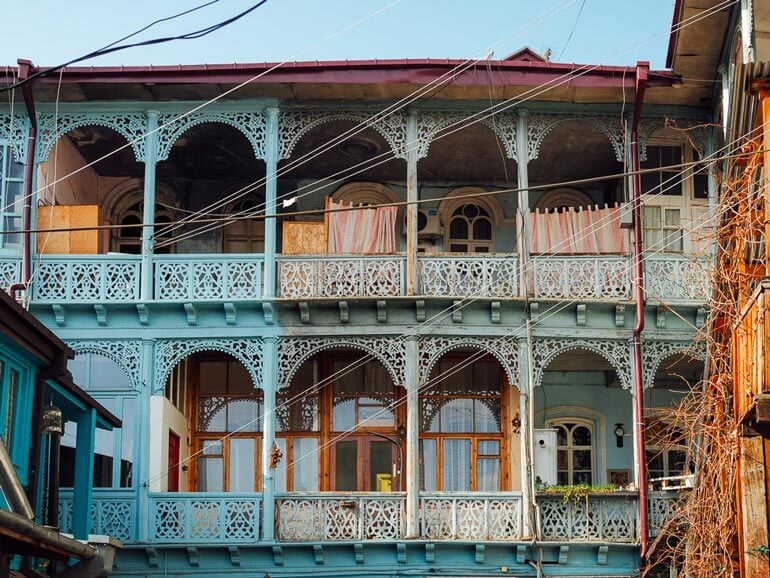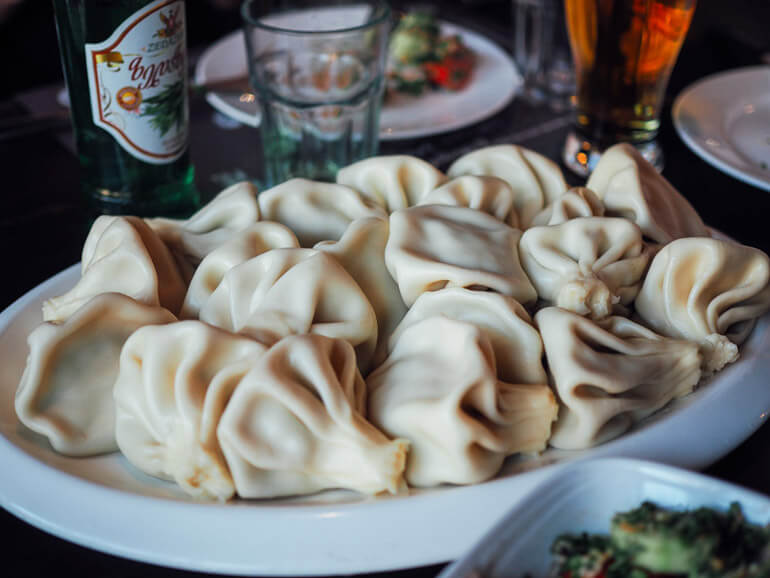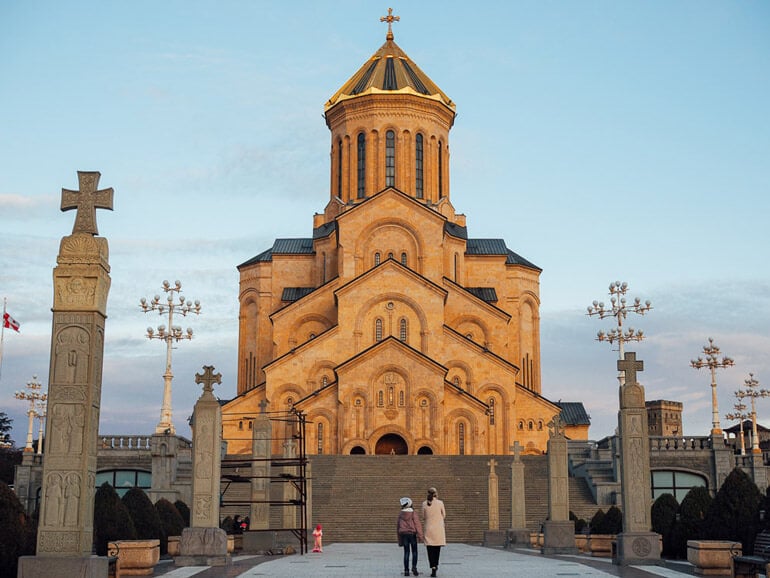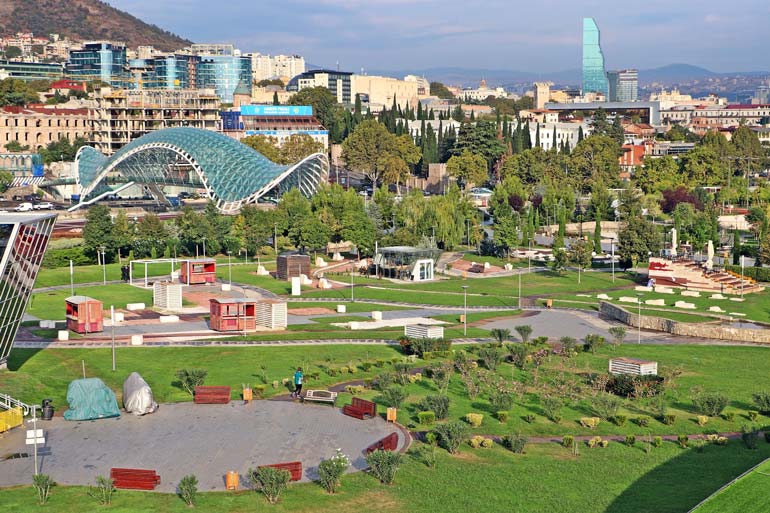Visiting Georgia: 11 Tbilisi Travel Tips to Know Before You Go
“The smile of a rose uplifts the nightingale” ~ Georgian Proverb.
Ever wondered what the secret is to having the most enjoyable trip possible? Welcome to my “Be Invisible” series – your ultimate guide for how to avoid looking like a tourist on your next adventure and guaranteed to boost your entire travel experience.
Bursting with helpful tips and tricks, I’ve asked locals from particular cities around the world to share their insider knowledge on the best ways travellers can become “invisible” when visiting their city and enjoy it like a local. If you’re ready to challenge travel stereotypes, overcome language barriers and embrace what I like to call invisible tourism, you’ve come to the right place!
| Curious how to not look like a tourist in Tbilisi, Georgia? I’m talking about the country situated between Europe and Asia – not the US state! This guide to Tbilisi travel tips written by Emily from Wander-Lush provides great insight about Georgian culture and values to help you make the most of your visit. I’m yet to visit Tbilisi myself, so I am very excited to share her 11 tips for how to best blend in during your trip. If you’re planning on visiting Tbilisi someday and want to avoid looking like a tourist, these do’s and don’ts in Tbilisi from a local’s perspective will help you have a more enjoyable experience and know what to expect before you go. Read on for more! |
This post contains affiliate links, at no extra cost to you. I may earn a small commission if you click through and make a purchase.

11 incredibly useful travel tips for Tbilisi, Georgia
Most people visit the Republic of Georgia for one of three reasons: To hike in the Greater Caucasus mountains, to visit the vineyards where archaeologists discovered evidence of the world’s oldest winemaking tradition, or to binge on Khinkali and Khachapuri, the soup dumplings and cheesy bread that put Georgian cuisine on the map.
Every traveller spends at least a few days in Tbilisi, the country’s capital and main hub. More and more people visit the city every year and yet Tbilisi is still a big unknown to many even seasoned travellers. Once you’ve established you’re talking about Georgia the country and not the US state, the questions about Tbilisi start coming in: Is it Europe or Asia? Do people speak English? Is it safe?
A big part of Tbilisi’s appeal lies in discovering these intersections and contradictions for yourself. But there are definitely a couple of things you should be aware of before you go so that you don’t get caught off guard.
If you’re curious about Georgia but don’t know where to start, check out these unique things to do in Tbilisi.

1. Do get out and explore the city on foot
Tbilisi is the product of centuries of influence from all four corners of the globe. Its position at the frontier of Europe and Asia and location on the old Silk Road has gifted the city with a huge mix of architectural styles and traditions.
You can find Persian-style bath houses, Zoroastrian fire temples, classic Tbilisi courtyards, ancient Orthodox churches, Soviet-era mosaics and Bruatlist apartment blocks all within a few blocks of each other.
If you have any hope of taking in even half the details, you simply have to don your walking shoes and explore the city on foot. The best areas to wander around are Abanotubani, the old German neighbourhood around Marjanishvili, and Sololaki, the city’s oldest residential district.
Sololaki is home to dozens of opulent homes built by merchants at the height of Tbilisi’s trade-city days. Most were seized during the Soviet era and divided up to house multiple families, and now many of the buildings are literally falling apart.Other heritage homes have been diligently restored.
TIP: Every building has a story and you’ll notice plaques all over Tbilisi commemorating the famous authors, poets and playwrights who once lived there.
Tbilisi begs to be photographed, but do be mindful when snapping photos of private houses and common courtyards. People are generally very welcoming but remember to be respectful of their privacy.

2. Do read-up on the sulphur bath etiquette
Nude or not, that is the question! The Abanotubani sulfur baths are a Tbilisi institution and a must-do when you visit – just be warned that the etiquette is quite different to what you might have experienced in Istanbul or Budapest.
Located in the heart of the city, the baths are fed by natural water springs that run under the streets (the name Tbilisi comes from the word for ‘warm place’).
There are almost a dozen domed bathhouses to choose from, ranging from the luxurious Chreli-Abano to the more-authentic Gulo’s and Bathhouse No 5. Some are public and others offer private rooms that you rent by the hour.
On the whole, the experience is a lot more casual and less ‘ceremonial’. It’s often not completely obvious what to do or where to go, so it’s a good idea to read up on these tips for visiting the Tbilisi sulphur baths before you visit.
3. Don’t even think about eating khinkali with a knife and fork
Khinkali ‘soup dumplings’ are without a doubt one of Georgia’s most famous foods. These little dough parcels originated in the mountains and are said to be a descendent of Xiaolongbao introduced by way of the Mongols (you can see the resemblance in the shape).
Georgian khinkali filled with either spiced pork/beef, sautéed mushrooms, cheese or potato are the most ubiquitous. Vegetarians will be pleased to know that many dishes are meat-free by nature.
You can find khinkali on almost every menu. Most places require a minimum order of 5 dumplings, usually costing 1-1.50 Georgian lari (30-45 cents) per piece. There are a handful of restaurants in Tbilisi that still make khinkali by hand.
It’s considered a cardinal sin to eat your khinkali with a knife and fork – so put that cutlery away! Instead, you must grab the khinkali by its doughy ‘nipple’, take a small bite and suck out the juice (that’s the best bit) before devouring the rest.
TIP: It’s considered polite to leave the knob behind on your plate, but no one will judge you if you eat the whole thing.

4. Don’t throw bread in the bin
As you move around Tbilisi and the rest of Georgia, you might notice plastic bags tied to the outside of dumpster bins. Bread is considered sacred and it’s taboo to bin even your crusts, thus many people package up their leftovers and leave them outside.
TIP: Sometimes you’ll see offcuts and stale bread scattered on the grass for the birds to enjoy.
Traditional Georgian bread (Shotis Puri) is shaped like a canoe or a baton. It’s cooked in a clay oven called a tone, the Caucasus version of a tandoor. It’s scrumptious when hot, so you’d do well to track down your nearest bakery – there’s a tone on almost every block in Tbilisi.

5. Do remember to adjust your watch to Tbilisi time
One fact of Tbilisi life that often causes culture shock is that the city is late to rise. Banks are open from 9.30am on weekdays, but office hours are a bit later so many people don’t start work until mid-morning.
The biggest implication for visitors is that breakfast can be very hard to come by. There are a handful of cafes and restaurants that open before 10am, but finding good coffee and a sit-down meal before 11am can be a challenge.
TIP: If you’re staying at a guesthouse, opt for the home-cooked breakfast if it’s available.
Most shops, malls and museums open at 10am. If you like to get an early start, stick to outdoor activities (parks, markets) in the morning. It’s also useful to know that museums and most of the major tourist sites are normally closed on Mondays.
During evening peak hour (approximately 6-8pm) traffic is gridlocked, buses are packed and the metro is full. Avoid travelling or going to the grocery store during these hours.
6. What to know about Tbilisi? Don’t mind the street dogs
One of the first things visitors to Tbilisi usually comment on is the huge number of street dogs. There are thousands – probably tens of thousands – of pooches living rough in the city.
But you’ll also notice that the majority of dogs look relatively healthy and happy. Those wearing a colourful plastic tag on one ear have been neutered and vaccinated against rabies as part of a project launched by City Hall.
They might not have a home, but most dogs ‘belong’ to the neighbourhood and are fed by everyone. Some even have their own kennels in the nearest park.
Most dogs in the city are timid and even affectionate towards humans as a result. You should still exercise common sense around dogs, but there’s no need to be afraid of them – most of the time they just want a pat (and maybe a corner off your khachapuri). Dog poo on the footpath is much more of a hazard than the dogs themselves!
TIP: The large, hyper-aggressive dogs you find in the mountains and in rural areas are a very different story and should be approached with extreme caution.

7. Do observe the dress code at churches & monasteries
Georgia is a predominantly Orthodox Christian nation with some seriously spectacular churches, monasteries and nunneries. There is a clear dress code when visiting religious sites – and although it’s more strictly enforced in rural areas, you still need to be prepared to dress appropriately in the capital.
Modesty is key. For men, that means long pants that cover the knees (no shorts) and a top that covers the shoulders. Women also need to have their knees and shoulders covered, should avoid tops with a deep neckline, and must cover their hair.
Some churches require women to wear a long skirt rather than pants, especially if they’re tight-fitting.
Every church in Tbilisi has headscarves at the door that you can borrow to throw over your hair. Some also have wrap-around apron skirts. For hygiene reasons and for ease, it’s a good idea to carry your own lightweight cotton scarf with you in your bag.
TIP: For everyday wear, casual ‘street clothes’ are perfectly acceptable in Tbilisi. If you want to blend in, it’s a good idea to wear longer pants in summer and dark colours in winter.

8. Don’t attempt to cross a main road in Tbilisi
Busy roads such as Rustaveli Avenue don’t have pedestrian crossings or lights. Instead, you must use an underpass to get from one side of the street to the other. These can be very hard to spot if you don’t know what you’re looking for – keep an eye out for the green signs showing a figure walking down the stairs.
Underpasses are their own little microcosms and often have thrift shops, bakeries, shoe makers and repair workshops inside. It sometimes feels like a parallel underground universe beneath the city streets! Keep your eyes peeled for some cool street art as well.
TIP: The longer tunnels, especially the one under Freedom Square, have multiple entrances/exits and can be very disorientating.
9. Do download an app to book taxis
Central Tbilisi is a walkable old town, but if you’re planning to venture further out then you may need to take a taxi. Taxis are regulated but 99% are unmetered, so when you pick up a cab on the street in Tbilisi you must negotiate the fare before you set off.
This can be pretty tricky if you and your driver don’t speak the same language. Thus for ease and to avoid any confusion over directions or price, it’s a good idea to buy a sim card and data package (Magti is the best provider) and download a taxi booking app.
TIP: There is no Uber in Georgia but Bolt is the most popular local equivalent. Using apps is very mainstream and most locals use them too. Bolt offers you the option to tip your driver at the end.
If you’re not fussed on taxis, try the underground metro for a flat fare of 50 tetri (15 cents). Apart from being affordable and convenient, riding the Soviet-era metro is quite an experience.
The trains move very fast (sometimes a little too fast!), as do the escalators at the underground stations, so hang onto the handrails!

10. Don’t be surprised if a stranger hands you their wallet on the bus
To use the Tbilisi metro or city buses, you’ll need a rechargeable MetroMoney transport card, which you can buy from any metro station. When you board a bus (always through the backdoor, never through the front!), you must swipe your card on the ticket machine.
If the bus is crowded, you’ll often see people pass their entire wallet down a line of people to reach the machine. Whoever is closest does the swiping then hands it back down the line.
Another thing you might encounter is seated passengers offering to hold your bag on their lap if you have to stand in the aisle.
These little acts of kindness and shows of trust on public transport are just one example of the sense of community that sets Tbilisi apart from most other big cities.
11. Do take the time to learn some Georgian
One of the most important Tbilisi travel tips is that Georgians are fiercely proud of their national language. Wrapping your tongue around more than Garmajoba (hello), Madloba (thank you) and Naxvamdis (goodbye) might be too much of an ask, but people will be thoroughly impressed if you can manage even these basics.
If you speak English, you’ll have no trouble getting around in Tbilisi. It’s the most common second language among the younger generations (many people additionally speak Russian), and in the capital at least you can always find someone who speaks fluently.
TIP: You’ll find English is spoken even in smaller towns and rural areas as well, especially among guesthouse owners and those involved with tourism.
As well as learning a couple of phrases, it’s a nice idea to learn the Georgian alphabet. Every letter is ‘pure’ and makes the same sound no matter what (no blending of letters as in English). Once you can tell the beautiful looped characters apart, you’ll be surprised by how much you can read and understand.
| Australian-born Emily is a fellow responsible travel writer, photographer and freelancer who has been living and working through Southeast Asia and the Caucasus since 2015. For future updates from Tbilisi, follow Emily on Facebook and Instagram! |

Things to do in Georgia to book in advanceBe organised and get more out of your trip by booking fun activities around Tbilisi to enrich your visit:
|
Ready to be invisible in Tbilisi?
Now you’ve uncovered these do’s and don’ts in Tbilisi, perhaps you’re ready to make the trip! Why not compare hotel prices here?
Do you have any Tbilisi travel tips to add to this list? Any more things to know before travelling to Tbilisi? Let me know in the comments below.
I hope you enjoyed this instalment of my Be Invisible series! If you found this helpful, please share it or follow me on Facebook, Pinterest, Instagram and TikTok for more!
Featured image credit: Pixabay
Pin mage credits: Unsplash/Unsplash
Remaining images copyright to Wander-Lush and used with permission.
This guide to Tbilisi travel tips contains some affiliate links, at no extra cost to you. I may earn a small commission if you decide to make a purchase and if you do, thanks for your support! This helps with the costs of running my blog so I can keep my content free for you. As always, I only recommend a product or service that I genuinely love and use myself!




The architecture in Tbilisi is amazing and you can always find an interesting building/structure even if you are walking in the same area everyday. Rike Park is a beautiful city park for locals and tourists alike.
In fact, I made a scavenger hunt there)
Thanks for putting together such a wonderful list! Georgia looks amazing with so much to do! I especially love the quirky clock and the bazaar 🙂
It really does look incredible! Thanks for reading 😊